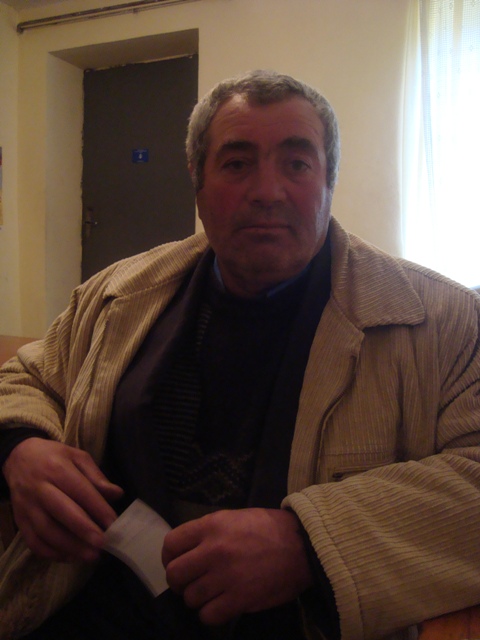
Since the war started he did not leave his native village of Ditsi in Gori district. He witnessed the disaster of the war personally. He lives in the village together with his wife; his two children live in Rustavi. Temur Jarmelashvili said that his son arrived in the village on August 12 to take his father from there; but unfortunately, he was taken hostage together with his father to Tskhinvali.
Ossetian side released the father and son 16 days later. Despite huge psychological trauma the government did not compensate them; even more, the authority did not provide them with psychological assistance.
“On August 12, 2008 my son arrived from Rustavi to take me there. We packed as much stuff in the car as we could and left the village. On our way through the village of Tkviavi three armed Ossetian men stopped us; they took us out of the car; ordered to kneel down. We did not resist them because they had already killed a man before us and we got afraid. They placed us in another car and took to Tskhinvali,” said Temur Jarmelashvili.
Ossetians placed the hostage Jarmelashvilis in the police station in Tskhinvali where almost 150 hostages were already kept. There were several women among them. The women were released one day before the men. The hostages from Ditsi were placed in one small room where because of few beds people slept on the floor. Their food was unsalted buckwheat, sugar-free tea and one slice of bread. The Ossetians used the hostages to clean the destroyed town and to bury dead people.
“One day they took 6 men to bury dead soldiers; we buried 26 bodies,” recalled Temur Jarmelashvili.
His son, Davit Jarmelashvili was made to bury dead cows. Five people beat him so ruthlessly that the father could not recognize the son in the isolator. Today, the young man needs medical treatment because after the beating he has some excrescence on his temple.
“Red Cross” used to visit hostages in Tskhinvali; they were providing the arrestees with medical assistance and tried to collect necessary information from them.
The released 85 people were delivered to Georgian side at the checkpoint in the village of Karaleti; the former hostages were taken to Gori Hospital and then to Dighomi Police Department in Tbilisi where everybody was interrogated one by one. The damage of Temur Jarmelashvili was assessed with 8 000 GEL but state has not assisted him at all.
The information is posted on the website of the parliament of Georgia: “Soon after the war, the victimized people in the war operations in August of 2008 are provided with psycho-social assistance. It was the first occasion when the parliament, the government and non-governmental sector worked out common plan for the psychological rehabilitation of these people.”
Shida Kartli Regional Administration stated that there is no concrete state program for former hostages. “However, the former hostages will have advantages over other victimized people; for example, if ten people apply to our administration for help we will first of all assist former hostages. Unfortunately, no hostages have applied to us yet,” said Natia Omadze, spokesperson of Shida Kartli Regional Administration.
Tea Tedliashvili, Gori



